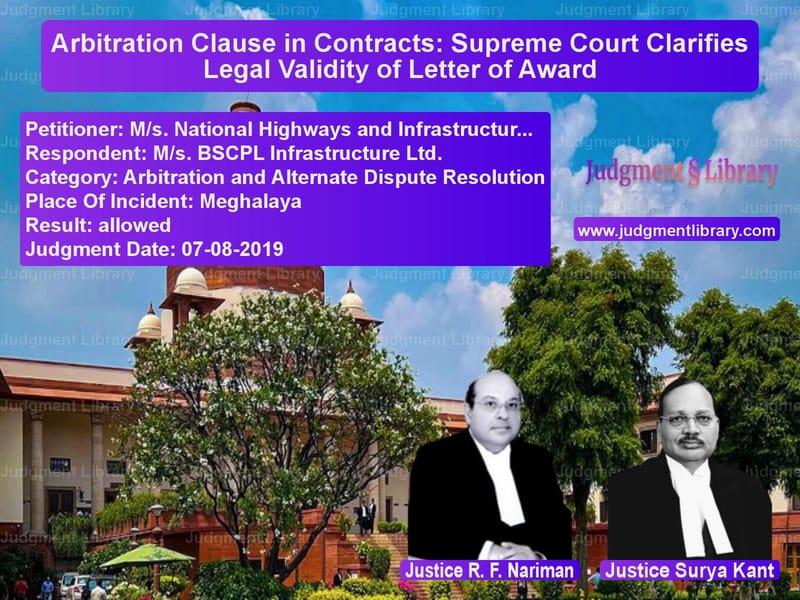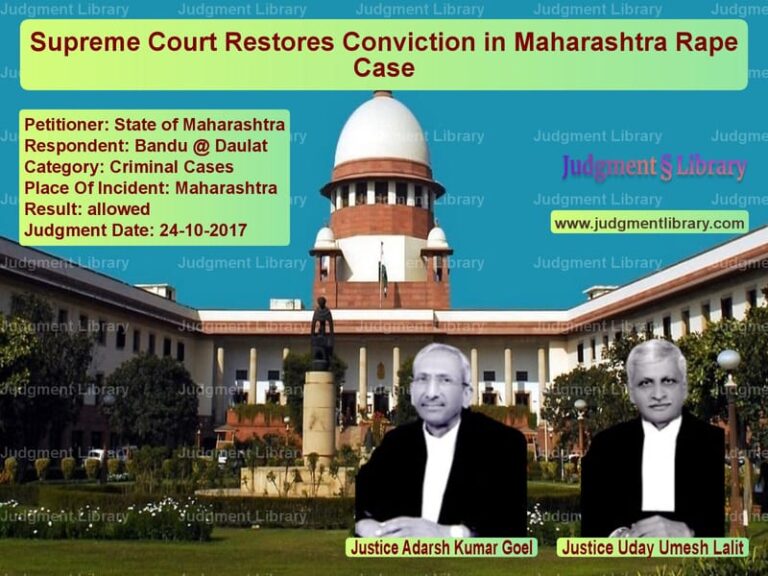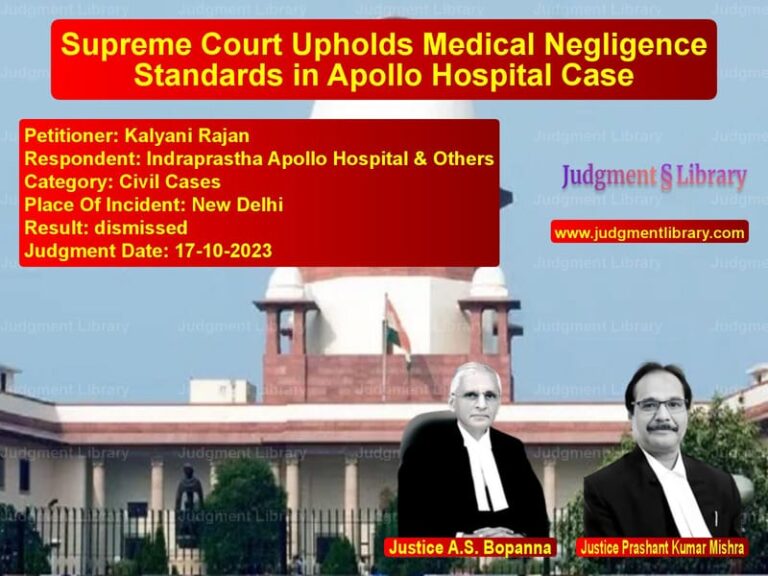Arbitration Clause in Contracts: Supreme Court Clarifies Legal Validity of Letter of Award
The case of M/s. National Highways and Infrastructure Development Corporation Ltd. vs. M/s. BSCPL Infrastructure Ltd. revolves around the interpretation of an arbitration clause in contract agreements. The Supreme Court’s ruling provides crucial clarity on whether an arbitration clause becomes binding at the Letter of Award (LOA) stage or only upon the execution of a final agreement.
The central legal issue in this case was whether the arbitration clause contained in a draft agreement could be enforced when the final contract was never signed.
Background of the Case
The appellant, National Highways and Infrastructure Development Corporation Ltd. (NHIDCL), issued a Request for Proposal (RFP) for road construction in Meghalaya. The respondent, BSCPL Infrastructure Ltd., submitted its bid and was issued a Letter of Award (LOA) on October 31, 2014. The LOA required the respondent to acknowledge receipt and subsequently execute the final contract agreement within 15 days.
The respondent acknowledged the LOA on November 5, 2014, and expressed willingness to sign the contract by November 13, 2014. However, due to a delay in obtaining a No Objection Certificate (NOC) from the Khasi Hills Autonomous District Council, NHIDCL withdrew the LOA on August 4, 2016, before the final contract was executed.
The respondent sought the appointment of an arbitrator based on the arbitration clause in the draft contract included in the RFP. The Delhi High Court ruled in favor of arbitration, holding that a general reference to the draft agreement was sufficient to enforce the arbitration clause.
Petitioner’s Arguments (NHIDCL)
The appellant (NHIDCL) contended that:
- The LOA was not a concluded contract, as it explicitly required the execution of a final agreement.
- The arbitration clause was part of the draft agreement, which was never signed and therefore not legally binding.
- The case was similar to PSA Mumbai Investments PTE. Ltd. v. Board of Trustees of Jawaharlal Nehru Port Trust, where the Supreme Court held that arbitration clauses in draft agreements are not enforceable unless explicitly incorporated.
- The bidding process was subject to Indian law, and the Delhi courts had exclusive jurisdiction under Clause 6.1 of the RFP, which could not be overridden by arbitration.
Respondent’s Arguments (BSCPL Infrastructure Ltd.)
The respondent countered that:
- The LOA was an enforceable contract, and the arbitration clause in the draft agreement was incorporated by reference.
- The withdrawal of the LOA was arbitrary and unfair, entitling them to seek dispute resolution through arbitration.
- Clause 2.1.14 of the RFP stated that upon acceptance of the LOA, the agreement was liable to be terminated, which implied that a binding agreement had already come into existence.
- The Delhi High Court correctly ruled that the arbitration clause was valid and enforceable.
Supreme Court’s Observations
The Supreme Court analyzed the legal principles governing the formation of contracts and arbitration clauses, making the following key observations:
- The PSA Mumbai Investments case set a clear precedent that arbitration clauses in draft agreements are not binding unless explicitly incorporated in the final executed contract.
- The RFP contained a disclaimer stating that the bidding process did not constitute a binding agreement.
- Clause 6.1 of the RFP vested exclusive jurisdiction with the Delhi courts, contradicting the argument that arbitration should apply.
- Clause 2.1.14, which stated that the agreement was “liable to be terminated,” did not prove that a contract had already been formed.
- There was no absolute and unqualified acceptance of the offer, which is essential under Section 7 of the Indian Contract Act, 1872.
Key Ruling and Verdict
The Supreme Court set aside the Delhi High Court’s decision and ruled that:
- The arbitration clause in the draft agreement was not enforceable since no final contract was signed.
- The LOA was only a step in the bidding process and did not constitute a binding contract.
- Any disputes arising from the bidding process must be resolved by the Delhi courts as per Clause 6.1 of the RFP.
The Court held:
“Even at the stage of acceptance of LOA, if disputes arise between the parties, they can only be resolved by the Courts of Delhi and not by arbitration.”
Implications of the Judgment
This ruling has significant implications for contract law and arbitration in India:
- Enforceability of Arbitration Clauses: An arbitration clause in a draft agreement is not binding unless expressly incorporated in the executed contract.
- Finality of Contracts: The issuance and acceptance of an LOA do not necessarily constitute a concluded contract.
- Jurisdiction Clarity: Bidding documents that specify exclusive jurisdiction for courts cannot be overridden by arbitration.
- Business Impact: Companies engaging in government contracts must ensure that all agreements are formally executed before relying on dispute resolution clauses.
The Supreme Court’s ruling reinforces the principle that arbitration agreements must be explicitly agreed upon and cannot be inferred from preliminary documents.
Petitioner Name: M/s. National Highways and Infrastructure Development Corporation Ltd..Respondent Name: M/s. BSCPL Infrastructure Ltd..Judgment By: Justice R. F. Nariman, Justice Surya Kant.Place Of Incident: Meghalaya.Judgment Date: 07-08-2019.
Don’t miss out on the full details! Download the complete judgment in PDF format below and gain valuable insights instantly!
Download Judgment: Ms. National Highwa vs Ms. BSCPL Infrastru Supreme Court of India Judgment Dated 07-08-2019.pdf
Direct Downlaod Judgment: Direct downlaod this Judgment
See all petitions in Arbitration Act
See all petitions in Commercial Arbitration
See all petitions in Dispute Resolution Mechanisms
See all petitions in Judgment by Rohinton Fali Nariman
See all petitions in Judgment by Surya Kant
See all petitions in allowed
See all petitions in supreme court of India judgments August 2019
See all petitions in 2019 judgments
See all posts in Arbitration and Alternate Dispute Resolution Category
See all allowed petitions in Arbitration and Alternate Dispute Resolution Category
See all Dismissed petitions in Arbitration and Alternate Dispute Resolution Category
See all partially allowed petitions in Arbitration and Alternate Dispute Resolution Category







